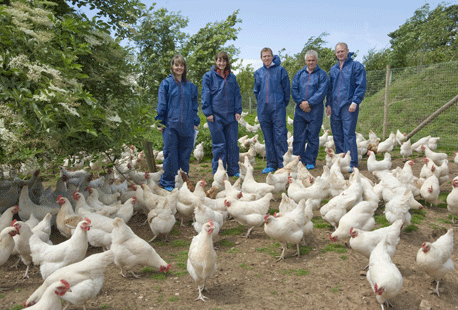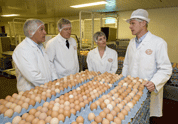FW Awards: Highest standards lead to profitable business

- David and Helen Brass
- The Lakes Free Range Egg Company, Penrith, Cumbria
High ethical standards often conflict with running a profitable egg business. But David and Helen Brass have simply used them to add value by offering a unique selling point.
The couple have seen turnover increase nearly twentyfold over the past 10 years, to £10m at The Lakes Free Range Egg Company.
It started back in 1998, when David left the air force and now, with the help of his wife, Helen, he has taken his parents’ traditional family farm in a new direction.
“At first we didn’t know what to do with the 49ha (120-acre), beef and sheep farm. But having looked at a friend’s operation, we thought free range-eggs could be a good option for us,” says David. Now the business includes three farms on 55ha (138 acres) with 53,000 free-range laying hens.
Initially supplying eggs to local shops, the couple decided to invest £1m in a packing plant, after a nearby packing station closed. Today, they sell more than 100m eggs a year to McDonald’s as well as Morrisons and local suppliers.

Animal welfare and environmental impact were key to them winning the McDonald’s contract, which wanted a European “flagship farm” to set an example.
And the Brass family’s focus on ethics and green issues has brought other benefits to the business, notably giving a unique selling point to their latest product, Natures Nest Eggs, recently launched in 200 Morrisons’ stores.
“For each dozen eggs sold, a penny goes to local wildlife enhancement projects protecting red squirrels, dormice and osprey in this area,” says David.
Also unique to the company is the requirement for all its producers to follow its government-approved biodiversity action plan for the planting of trees, hedges and wildlife. This was developed jointly with the Farm Wildlife Advisory Group (FWAG).
“We have been planting trees since the late 1990s. We pay our producers for trees they plant and FWAG recommends the type of trees and manages them for us,” says David. Willows and poplars grow quickly and are used for cover. The trees benefit production, help prevent feather-pecking and encourage the birds to venture on the range outside.
The result of all this is that in 2006 alone, the company planted 60,000 trees. That’s enough to cover 91 football pitches at the standard density of 1000/ha.
Another benefit of focusing on green issues is lower energy costs. For example, stipulating the use of naturally-ventilated houses has improved energy efficiency by up to 70%.
Consequently, they believe they have the lowest carbon footprint of any egg producer in the UK.
The couple are offering a substantial amount of training to their producers, amounting to £50,000 a year.
Training sessions cover benchmarking, where results from supplying farms are discussed and knowledge is given to raise performance where necessary. Basic hygiene and rodent control courses are run for new producers.
The company also funds up to three producer days a year offering opportunities to learn from guest speakers, including vets, nutritionists and other specialists.
It’s not just staff the Brasses are keen to educate. They work with The Lake District National Park education department, showing children around the farm, to help spread the word on where eggs come from.
Looking to the future, the couple have plans in place for another packing station. “For the future we would like to progress in the same vain, with high ethical standards at the forefront of our plans,” adds David.

Farm Facts
- 53,000 free-range laying hens split over three farms
- 100m free-range egg sales annually
- 2000 trees per farm
- Employs 45 staff
- Supplying McDonald’s and Morrisons
What the judges liked
- High welfare and environmental credentials
- Reaping business rewards from green ethics
- Dedication and focus on the free-range egg market
- Care for contract producers
- Impressive business plan
